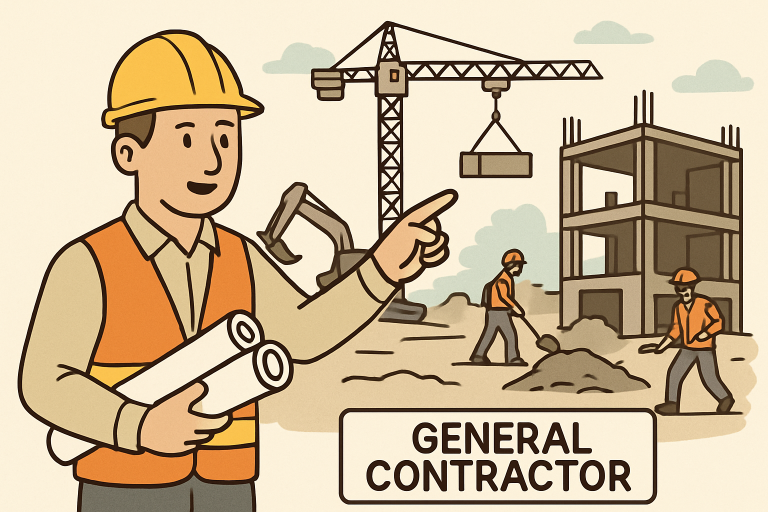Table of Contents
- Introduction
- Understanding the Role of a General Contractor
- Key Factors to Consider When Choosing a General Contractor
- Importance of Licensing and Certifications
- Evaluating Experience and Past Projects
- Assessing Communication and Project Management Skills
- Understanding Contracts and Cost Estimates
- Ensuring Safety and Compliance
- Conclusion
Introduction
Embarking on a construction or renovation project is a significant undertaking that requires careful planning and execution. One of the most critical decisions you’ll make is choosing the right general contractor to oversee the project. Whether it’s a home remodel or a major commercial build, selecting a reputable professional will help bring your vision to life while minimizing stress and uncertainty. Check out GC near me to simplify your search, which can connect you with trusted general contractors.
A competent general contractor ensures that your project stays on track, within budget, and up to quality standards. Making the right choice protects your investment and meets your goals.
Understanding the Role of a General Contractor
A general contractor is responsible for the comprehensive oversight of a construction project, from the earliest planning stages to the final walkthrough. Their responsibilities include hiring and managing subcontractors, sourcing building materials, coordinating schedules, securing necessary permits, and ensuring all work meets building codes and quality expectations. Acting as your primary point of contact, a general contractor keeps all moving parts synchronized and advocates for your interests throughout the process.
Key Factors to Consider When Choosing a General Contractor
Your choice of contractor can make or break your experience. Key elements to weigh include:
- Reputation and References: Look for contractors with consistently positive reviews, and don’t hesitate to contact past clients for firsthand feedback about their experiences.
- Experience with Similar Projects: A contractor should have a proven track record with projects similar in scope and complexity to yours, demonstrating relevant expertise.
- Financial Stability: Ensure the contractor has a sound financial history to reduce the risk of mid-project delays or issues caused by budget mismanagement.
- Clear Communication: The ability to communicate effectively and transparently is vital—open dialogue helps address questions, resolve concerns, and allows for confident decision-making every step of the way.

Importance of Licensing and Certifications
A legitimate general contractor should be licensed in accordance with local and state regulations. Working with a licensed contractor provides assurance that they’ve met minimum competency requirements and understand current building codes and laws. Further, certifications from esteemed industry organizations—such as those administered by the National Association of the Remodeling Industry (NARI) or Associated General Contractors of America (AGC)—demonstrate the contractor’s commitment to professionalism and continuing education. Don’t hesitate to verify these credentials before committing.
Evaluating Experience and Past Projects
A general contractor’s portfolio is a window into their craftsmanship and reliability. Request to see completed projects and ask for references. You can contact them directly. When reviewing their past work, pay close attention to the scale, style, and complexity of the builds—ideally, you want someone with experience on projects aligning closely with your own. Discuss how they navigated challenges and changes, as this insight can reveal their problem-solving skills and adaptability.
Assessing Communication and Project Management Skills
Strong project management and communication skills are central to a successful build. During your initial meetings, ask potential contractors to explain their process for updates and issue resolution. Do they provide a clear schedule and regular progress reports? Are they transparent about unavoidable changes or delays? A professional who listens actively and communicates plans clearly will help reduce unnecessary stress and keep your project running smoothly.
Understanding Contracts and Cost Estimates
A comprehensive contract is essential before work begins. This document should outline the project scope, construction timelines, payment schedules, warranties, and modification protocols. Every detail, including what is included or excluded (materials, labor, etc.) and who is responsible for obtaining permits, should be in writing. Ask for itemized cost estimates to avoid unpleasant budget surprises and clarify how the contractor deals with unexpected costs.
Ensuring Safety and Compliance
Safety is non-negotiable on any construction site. Confirm that your contractor follows a strict safety plan and complies with Occupational Safety and Health Administration (OSHA) standards. A reputable contractor will carry adequate insurance, maintain a safe work environment, and ensure all workers are trained in current safety protocols. Not only does this protect site personnel, but it also reduces your liability and helps keep your project on schedule by minimizing accidents and violations.
Conclusion
Choosing the right general contractor is vital for the smooth execution and ultimate success of your construction or renovation project. Meticulously screen potential candidates for credentials, experience, communication skills, and a strong commitment to safety. This diligence not only safeguards your investment but also sets the foundation for a rewarding building experience and a finished product that exceeds expectations.
For resources and guidance on hiring the right contractor, consider exploring organizations like the Associated General Contractors of America and the National Association of the Remodeling Industry.
